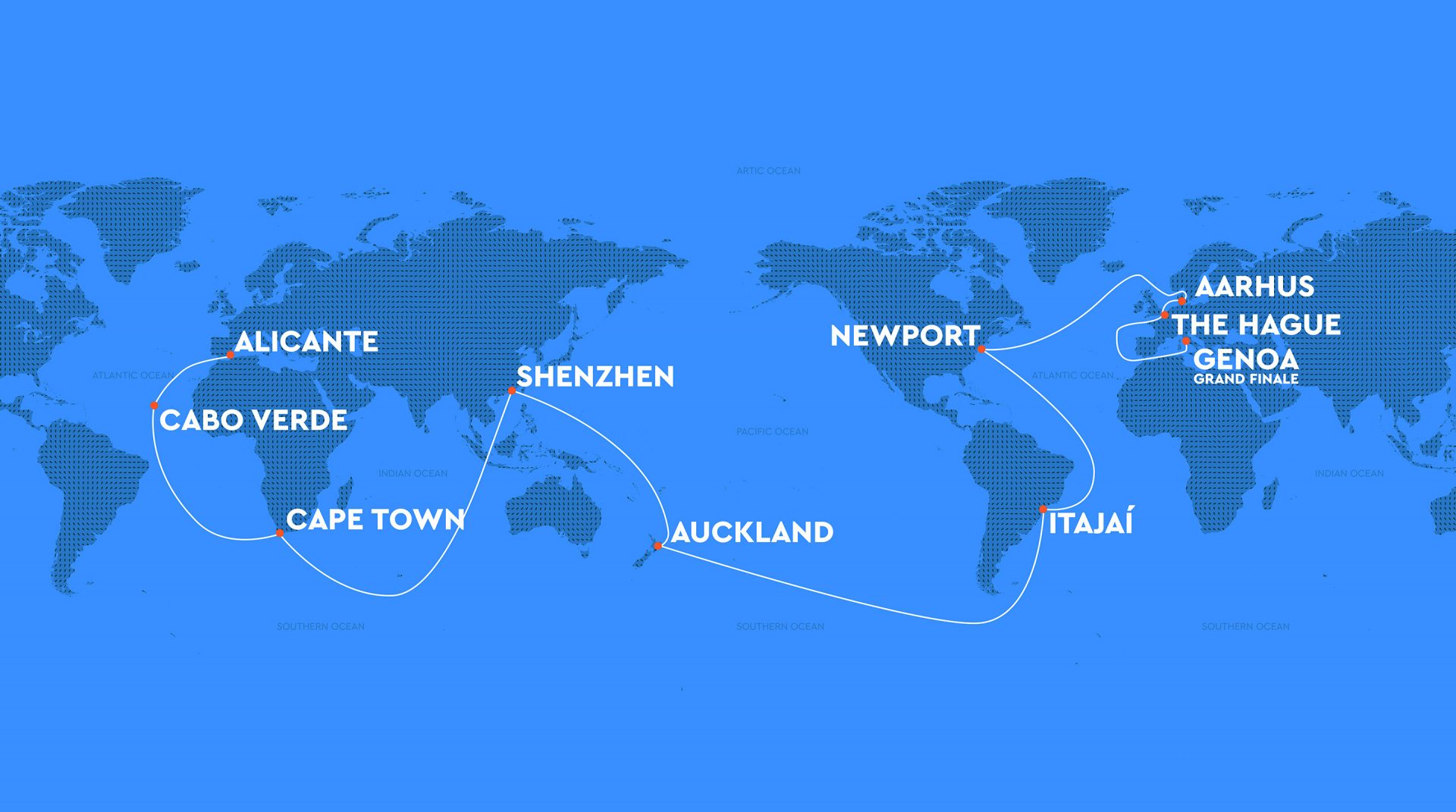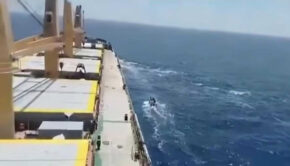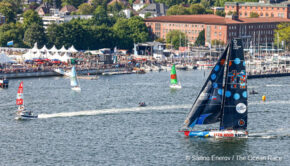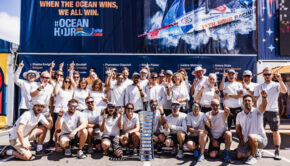Health crisis postpones The Ocean Race
Published on July 16th, 2020
(July 16, 2020) – Organizers of The Ocean Race have confirmed the next edition of the Race, planned to start in the autumn of 2021, will be postponed one year. The plan now is to begin October 2022 from Alicante, Spain, and finish in Genova, Italy, in the summer of 2023 during the 50th jubilee anniversary year of the Race.
For the first time in race history, further event timings have also been confirmed through the next 10 years and a feasibility study is currently underway for a European race to take place next summer.
The change to the start date for the next edition of the round the world race follows a strategic planning process and consultations with stakeholders to determine the best path forward in a sporting landscape impacted by COVID-19.
“Since 1973, The Ocean Race has been one of the toughest challenges in sport. Winning teams have showcased that proper preparation is the foundation for success. We now find ourselves in unprecedented times and our first priority is with all those who have been and continue to be affected by the pandemic,” said Richard Brisius, the Race Chairman of The Ocean Race.
“As an international sporting competition, with stops on six continents, we are deeply connected to the changing reality of sailors, teams, cities and partners across the world. We have worked positively together over the past months to develop a stable and improved future, and this has led to the first ever 10-year plan of The Ocean Race, a 10-year plan adapted to the new reality in an innovative, sustainable and responsible way.
“This provides improved opportunities for sailors, teams, cities and partners to prepare properly for The Ocean Race and it gives fans something outstanding to look forward to over the coming years.”
The next edition of the Race, as planned, will be open to fully-crewed entries in the V065 and IMOCA60 class.
“Winning The Ocean Race is still a big ambition for me,” said Olympic and America’s Cup champion Peter Burling, who competed in the event for the first time in 2017-18. “I know how much effort and planning and preparation it takes to put together a successful campaign. Building in this extra year ahead of the next race increases the likelihood of strong, well-prepared teams being ready on the start line in Alicante. I think this is a well-considered and good decision.”
“The world has changed with COVID-19 and again we will witness the resilience of sailors, stakeholders and organisers of The Ocean Race,” said Chris Nicholson, co-founder, W-Ocean Racing, and a six-time veteran of the Race. “We have all lost significant time right at the crucial moment and this change is the right move. This will now allow us the time again to re-focus our efforts and be part of this great event.”
The full, award-winning sustainability programme, a core pillar of the Race, will continue to grow under the banner of Racing with Purpose. The Ocean Race Summits, the Education and Science Programmes are all being enhanced and integrated into all facets of the organization of the Race.
“As the Founding Partner of the Sustainability Programme and Premier Partner of The Ocean Race, we stand in support of the decision to postpone the start by twelve months in response to the COVID-19 crisis,” said Jeremy Pochman, co-founder and CEO of 11th Hour Racing.
“The impacts of this pandemic are myriad. 11th Hour Racing is committed to working with The Ocean Race and its partners to remain nimble and adapt to these challenges — with the goal of running a safe and sustainable Race in 2022-23.”
Previously announced host cities and partners for the next edition of the Race will be involved for the 2022-23 event. Volvo Cars, Premier Partner of The Ocean Race, offered its unqualified support.
“We have been involved in The Ocean Race in one form or another for over 20 years now,” said Björn Annwall, Leader EMEA in the Executive Management Team at Volvo Cars. “We know the Race as the biggest challenge in sport. It attracts only the very best, where those best-prepared come out as winners. It is a responsible and insightful decision to adjust to the new realities now, as it allows for the athletes and other parties to prepare properly.
“For us The Ocean Race is more relevant than ever because the ocean is really symbolizing communication and travel and trade, and all of those are powerful ways of creating cultural understanding.”
The process of arriving at these decisions involved outreach and consultation with stakeholders.
“We have been looking at the future of The Ocean Race and taking in honest feedback from our stakeholders around the world for some time now,” added Johan Salén, the Managing Director of the Race. “Moving the start date allows our host cities, teams and partners the time they need to best prepare for the next Race.
“But at the same time, we understood stakeholders were looking for confirmation of a longer term plan and enhancements to the Race, which we are also developing.”
The next three editions of The Ocean Race will be fully-crewed, around the world yacht races and will take place in 2022-23, in 2026-27, and in 2030-31.
Meaningful racing will be scheduled in between editions, and a European event in the summer of 2021, for IMOCA 60s and VO65s, and potentially other classes of fast racing yachts, is currently being considered for feasibility by the organization along with registered teams and stakeholders.
“The Ocean Race Europe has been a vision and dream of ours and many others for a long time,” said Richard Brisius. “We imagine a race and festival for everyone that will inspire and unify across Europe. A celebration with engaged fans and athletes achieving the extraordinary while driving change for a healthier planet.
“We have been planning for The Ocean Race Europe to be held in between editions of The Ocean Race since we took responsibility for the Race last year. Originally we had been considering starting this in 2023, but we will now work with teams, cities, and partners to decide whether we should do it in the summer of 2021.”
For the 10 international host cities of The Ocean Race, the new calendar provides confirmation and clarity for the future.
Genova Mayor Marco Bucci said that hosting the finish of the Race in 2023 would be beneficial for the Italian stop, which is coming to the country for the very first time.
“Hosting the Grande Finale of The Ocean Race is something I know all of Genova and Italy is looking forward to,” Mayor Bucci said. “We had a small taste of how exciting it is when Genova and The Ocean Race work together when we hosted the first of The Ocean Race Summits back in September of last year.
“From our side, I know everyone involved with delivering this project for Genova will take advantage of the extra time we now have to ensure we have a truly special experience in 2023, which also happens to be the 50-year jubilee anniversary for the Race.
“At the same time, we are supportive of the idea of a European race in 2021. I think it could be an important event that helps promote unity, creating connections and inspiration as we emerge from the current crisis and rebuild. We will participate with all interested stakeholders in a feasibility study for a European race in 2021 as we believe it could be a good showcase for Genova and our maritime heritage.”
The Ocean Race remains committed to its heritage as the premiere fully-crewed offshore race on the sporting calendar. The new dates, along with other enhancements for the next edition of the Race will ensure the event has a sustainable future on and off the water.
Event details – Route – Teams – Facebook
Here was the plan prior to postponement:
The Ocean Race 2021-22 (formerly The Volvo Ocean Race) will be raced in two classes of boats: the high-performance, foiling, IMOCA 60 class and the one-design VO65 class which has been used for the last two editions of the race. Entries in the IMOCA 60 class will compete for The Ocean Race trophy, while those racing the VO65s will chase the Ocean Challenge Trophy.
Ten Stopovers for 14th Edition:
• Alicante, Spain: This historic Mediterranean port will host the start for the fifth consecutive edition in the autumn of 2021.
• Cabo Verde: More accustomed to having offshore teams sail by, or stop for repair, this archipelago of ten volcanic islands in the central Atlantic Ocean will become just the second African venue the race has ever visited and the first West African nation to host the event. Details.
• Cape Town, South Africa: Located on the shore of Table Bay, Cape Town, as the oldest urban area in South Africa, was developed by the United East India Company (VOC) as a supply station for Dutch ships sailing to East Africa, India, and the Far East. Located at latitude 33.55° S, it’s approximately the same as Sydney and Buenos Aires and equivalent to Casablanca and Los Angeles in the northern hemisphere. Details.
• Shenzhen, China: Located in the southeast, the city is a modern metropolis that links Hong Kong to China’s mainland. It’s known for its shopping destinations and features contemporary buildings, such as the 600m-tall skyscraper Ping An International Finance Centre, and a number of amusement parks. The city is a leading global technology hub and was one of the fastest-growing cities in the world in the 1990s and the 2000s. Details.
• Auckland, New Zealand: European, Polynesian, Asian, and strong Maori heritages give Auckland its distinctive culture. Located in the North Island of New Zealand, it is the most populous urban area in the country with an urban population of around 1,570,100. Details.
• Itajaí, Brazil: To the south of Rio de Janeiro, Itajaí was founded in the mid-19th century by German and Italian colonists, and is now the commercial centre and Atlantic port for an agricultural region drained by the Itajaí River and its tributaries. Details.
• Newport, USA: Located on Aquidneck Island, Newport is 74 miles south of Boston and 180 miles northeast of New York City. It is known as a New England summer resort and is famous for its historic mansions and its rich sailing history. It was the location of every challenge to the America’s Cup between 1930 and 1983. It is also the home of Naval Station Newport, which houses the United States Naval War College, the Naval Undersea Warfare Center, and an important Navy training center. This is the third consecutive edition of the race to stop in Newport. Details.
• Aarhus, Denmark: The course comes to the east coast of the Jutland peninsula during the spring of 2022, following a popular ‘Fly-By’ of the city during the final leg of the 2017-18 edition of the Race. Details.
• The Hague, Netherlands: This city along the North Sea coast will welcome the race for a third consecutive time, first coming as a ‘pitstop’ on the final leg of the 2014-15 edition and as the final finish port for the 2017-18 race. Details.
• Genoa, Italy: As the birthplace of Christopher Columbus, this first-time race host is Italy’s largest sea port yet remains full of grandeur as the gateway to the Riviera while offering weighty architectural heritage. Details.










 We’ll keep your information safe.
We’ll keep your information safe.